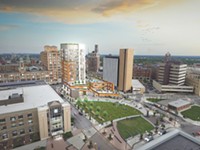[
{
"name": "500x250 Ad",
"insertPoint": "5",
"component": "15667920",
"parentWrapperClass": "",
"requiredCountToDisplay": "1"
}
]
Dan Hurley, president of Upper Mt. Hope Neighbors, sent a letter out to members of his group shortly after the Corner Bakery Café in College Town closed in March. He was peeved. After Saxbys Coffee in College Town closed two months later, however, Hurley's tone graduated to just short of livid over College Town as a whole.
"I'm now seeing this as a project that needs to be re-evaluated to see how the public, the neighborhood, and the students who live close by benefit when their choices now become that much more limited by a developer seemingly unwilling to check the pulse, letting this boat get evermore closer to the falls," Hurley wrote in the Saxbys letter to his neighborhood group. "Based on recent circumstances, I'd be shocked to find a tenant willing to sign a lease when they have so many other choices in our area. How is it the developer can't seem to grasp this?"
Hurley's not alone in his concern. Three College Town businesses have closed this year; Constantino's Market kicked off the unhappy trifecta when it shut down in February. The natural question: is this project, which was propelled by promises of physical and economic transformation and delivered with a significant infusion of public money, in trouble?
No way, says the University of Rochester, which owns the 14 acres that College Town is built on and rents a significant amount of space in the development. Attrition is a natural part of all large developments, says Colleen McCarthy, director of local government and community relations for UR.
"College Town is successful and will continue to be shaped by the addition of new tenants," she says. "Current tenant occupancy rate is 79 percent and new businesses and services are on the horizon."
Cass McCrory, director of marketing and events for College Town, says that every new development has a learning curve and that the developers are fine-turning the formula for College Town.
Rochester Running, Texas de Brazil steakhouse, Bar 145, and a dry cleaning and laundry opened in College Town within the last year, and a CVS is scheduled to open this fall, McCarthy says. A Barnes & Noble Café is planned for the former Saxbys space adjacent to the Barnes & Noble store, which serves as the UR's campus bookstore.
And the loft apartments in College Town have a waiting list, McCarthy says.
College Town tenants that CITY spoke to say that the media is focusing only on the negative and that risks attaching a permanent stench to the overall development which can make failure a self-fulfilling prophecy; the idea that "something terrible is happening over there."
Constantino's may have been a misfire from the beginning. Hurley and many others say that it was overpriced, especially for college students. The store also lacked visibility.
"A store like that needs to be up front," Hurley says. "It needs to be right on Mount Hope Avenue."
Hurley pins the closings of Saxbys and the Corner Bakery on behind-the-scenes drama. Calls to the corporate headquarters of both stores were not returned.
Hurley has a number of issues with Gilbane-Fairmount. The developer does not respond to issues at College Town quickly enough, and communication with the Mt. Hope neighborhood is lacking, he says. Hurley learned about the closings of Saxbys, Corner Bakery Café, and Constantino's from the media -- although the closings did seem to happen abruptly -- despite regular meetings with the developer, he says.
Marketing for the project hasn't been aggressive enough, although it has improved recently with things like movie night on the roof, Hurley says.
Perhaps most importantly, the development plan for College Town lacks cohesion, he says. A true "college town" would have clothing stores, home furnishing stores, and an affordable grocer such as Aldi, for example, he says.
"You need staple foods, so they don't go out to Henrietta," Hurley says. "You do have a dry cleaner and running club. So they've got a couple cool things. But they don't have all the things that I think would benefit a typical college town. Their business plan sucks; there's no other way of stating it."
College Town's McCrory says that Hurley's suggestion of possible tenants is important feedback and that the best way to get more tenants into College Town is to patronize the tenants that are there now.
And McCarthy says that college students represent only a portion of College Town's target consumer. College Town was developed as a mixed-use center for Mt. Hope area residents, staff and visitors to the University of Rochester Medical Center, UR faculty and staff, guests at the Hilton Garden Inn on the College Town site, and consumers from the broader Rochester area, she says.
So, with that in mind, the development team aims for a varied mix of tenants, McCarthy says.
Another issue: the rent. Local media have reported that some College Town tenants say that their rent is too high, and the tenants that CITY interviewed seem to agree. One tenant says that although business picked up significantly since she moved into College Town, it's still a struggle because the rent is so high.
Another says that he held off signing a lease until he was able to negotiate a lower rate.
McCrory says that rents are negotiated at a rate for tenants to be viable. The UR's McCarthy says that the university has no input into the rent structure.
The UR's McCarthy says that College Town's management team is responsive to tenants and engaged with the project. And tenants that CITY spoke to say that the Gilbane-Fairmount team isn't any better or worse than other landlords they've had in terms of how quickly their concerns are addressed. One tenant says that Gilbane-Fairmount printed and distributed price sheets for him, which was a big help.
McCrory says that project representatives regularly engage with the community and that they are always looking for opportunities to support the Upper Mt. Hope group and the Rochester community.
"We've worked through issues collaboratively and streamlined lines of communication over the last few months to ensure prompt and swift attention," she says.
The UR works with the development's management team to promote College Town's tenants and events, McCarthy says. The UR takes alumni and visitors to College Town during big occasions at the university, such as commencement weekend and new student orientation, she says.
UR students, faculty, and staff also have access to a free shuttle to College Town at specified times.
But Hurley says that College Town's backers still need to step up their game, especially given the amount of public money that went into the project. College Town received a $20 million federal loan from Housing and Urban Development, $4 million from the state economic development council, $13.5 million in tax incentives through the county Industrial Development Agency, and $17 million in public infrastructure improvements, among other assistance.
"You've got to be aggressive with your management and really keep a tight watch or else [tenants] are going to pass you up," he says. "They need to start really getting behind this. This whole thing was proved on public dollars."
Speaking of...
-

Colgate Divinity neighbors lose court battle to stop development
May 13, 2020 -

ROC the Riverway projects advancing
Feb 19, 2020 -

URMC plans orthopedic campus at Marketplace Mall
Nov 20, 2019 - More »
Latest in News
More by Christine Carrie Fien
-

Building up
Mar 29, 2017 -

Hetsko's heart
Mar 15, 2017 -

Squeezing starts at GateHouse-owned Daily Record and RBJ
Feb 28, 2017 - More »





